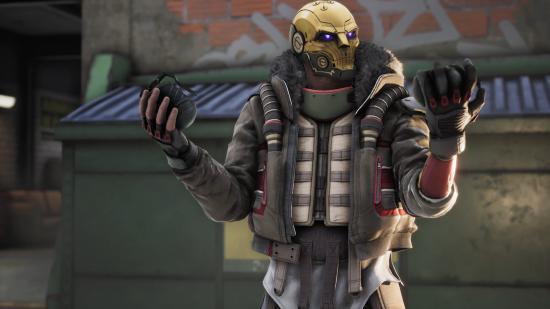If you watched the Future Games Show earlier this month, you’ll remember seeing Hi-Rez Studio’s latest game, Rogue Company. Developed by First Watch Games and set to be released later this summer, Rogue Company is an action-packed third-person tactical shooter that promises slick shooting in a new competitive setting.
The game was revealed last year during a Nintendo Direct show, and since then, we’ve had a smattering of information about what Rogue Company will look and feel like when it drops later this year. Featuring a roster of elite mercenaries, who all have a deep arsenal of weapons and abilities at their disposal, the game will take players across the world through a number of multiplayer missions and objective-based mode. Who are these mercenaries and who is paying them? Well, we don’t quite know – it’s a mystery. One thing we do know for sure though, is that the game will ship with both cross-platform play and cross-progression.
So to find out more about the new action-packed shooter, that looks a little bit like Dirty Bomb back in its day, we sat down with Bart Koenigsberg, the brand director of First Watch Games, to get the lowdown on all things Rogue Company.
The Loadout: First things first, how are things?
Bart Koenigsberg: Well the project is in late stage development and we’re going to be releasing in the summer, so it’s a mad sprint. We’ve been lucky to avoid any kind of crazy crunch. Yeah, that’s something that obviously is for the betterment of the industry as we continue to try to plan more effectively.
With home working too, that’s quite the feat.
Yeah, that’s true. You know, that’s, that’s actually an interesting kind of conversation. Institutionalised crunch may be gone, but when people are working at home, they tend to just kind of go hard. You know, you have to work with people and their work life balance a bit.

Let’s talk about the game. What does it take to launch a competitive shooter in today’s market?
I think you probably have a couple of options. Hi-Rez is a studio that makes really only free-to-play player versus player games as a service. So it’s certainly the case that is what we’re making here. When you think about a shooter as a service game, there’s been a variety of games like Dirty Bomb and those are probably the closest thing to what Rogue Company is going to look to do. Call of Duty’s approach as a service game is a little bit different than what you think of Smite, Paladins, or even Overwatch.
The update schedule and how you actually maintain a game as a service is a little bit different than how you would ship a $60 box with ongoing events and things. So, for us, it’s a lot about positioning the title in a less competitive space. So when you’re like, ‘oh, we’re this competitive shooter in a really competitive market’, the answer for us is to find a portion of the market that’s less competitive. For Rogue Company, the answer for that is we’re seeking to make an action forward game with meaningful shooting.
This game is familiar in the third-person sense – there’s dodge rolling, characters move relatively fast, and TTK’s are relatively long, but the devices and the characters abilities in no way outweigh your aim. It’s really about your characters’ abilities interacting with each other.
No one’s ever said, like, oh, we’re making an action tactical game, because that’s kind of an oxymoron. But that really is what we’re trying to make – an action game that has strong tactical elements.

So who would you say then your biggest competitors are?
Yeah, that’s a good question. I think I think in terms of where we are, our biggest competitors are probably like Valorant and Cyberpunk, right? Like what’s going to just suck the air out of the industry? As an indie that’s probably more competition than say Gears of War, Warface or Crossfire X right? Those games are closer in terms of what Rogue Company players are going to play. But really probably the biggest in terms of actual competition are the big industry releases.
How much of a say have content creators and esports pros had a say in the game?
I’ll address the esports part first. So we haven’t had too much of a fixation on bringing in esports players to get a tonne of feedback on the game at this stage. There’s two approaches to this: there’s Valorant, which is basically building a love letter to esports in software and then there’s building a game that you think is awesome, and when your community tells you that they want to compete in it, you accommodate them. That has been our strategy with all of our other games.
I think with Paladins we were a little bit more aggressive in terms of being like, ‘hey, in year three of this game, we’re gonna have a league.’ I don’t think the approach of Rogue Company is to pop a flare and say it’s going to be the next biggest esport – we take more of the approach of building an awesome multiplayer game and when the players are self- organising, support them. When and if that continues to grow, we grow with it.
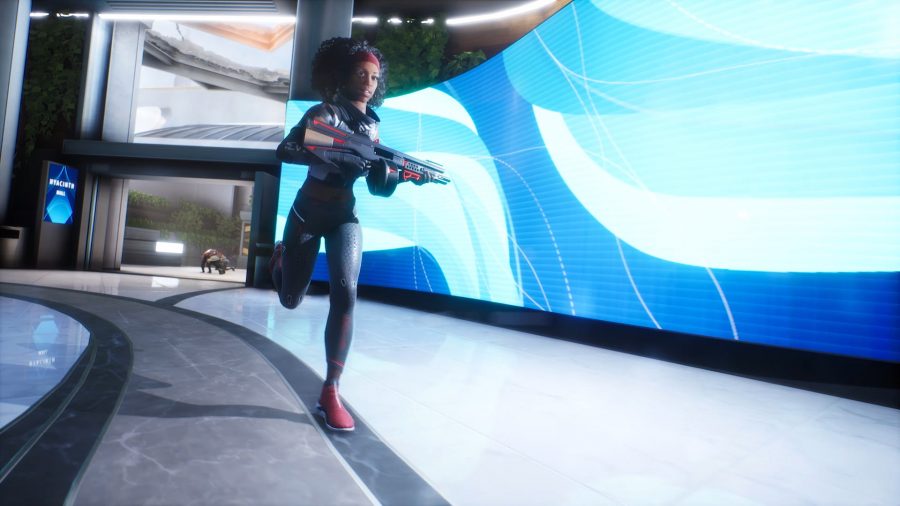
So have we been consulting with players? Yeah, we have. There’s a variety of methods through which we do that, obviously, maybe not obviously, we have an alpha. So in the alpha, we got a good lot of good feedback. Within that alpha, we have a core group of players that have either come from other Hi-Rez games or were early on very vocal, very design-oriented players. We also have a core testing group as well, made up of some ex-Paladins pros, some SMITE players, and some general shooter folks. The lead designer for this game is a gentleman named Scott Lussier who is a former Halo world champion. So his network of shooter friends has helped us build that out as well.
Outside of that we’ve had some contractual paid engagements with FPS influencers to get their feedback on the game, which varied, so we got a spectrum of feedback from influencers from like, Loaded, CA, OPG. That was a very, very cool experience. They spend all their day playing video games, so they have a lot of opinions about them!
So moving on, what are your plans for the first three, six, and 12 months post-launch?
Twelve is like the far future – maybe there will be aliens you know!
I think in three months, we will have a little bit more visibility, we’ll roll out a Trello board, roll out a roadmap, which will include a variety of cosmetics, new features like character mastery, weapon mastery, those types of things.
And then as we get towards the end of those three months and into that six month period, that’s when you probably start seeing things like ranked matchmaking and spectator support. Maybe we’ll start seeing the first shakings of what would be esports support…
You’ll also start seeing a variety of changes to the cadence of how characters come out. I think we’re looking at a rainbow model in terms of character releases, so probably six a year. But in the first month, players will probably get one character, and within six months, you’ll have like three. You’ll also see the first battle pass.
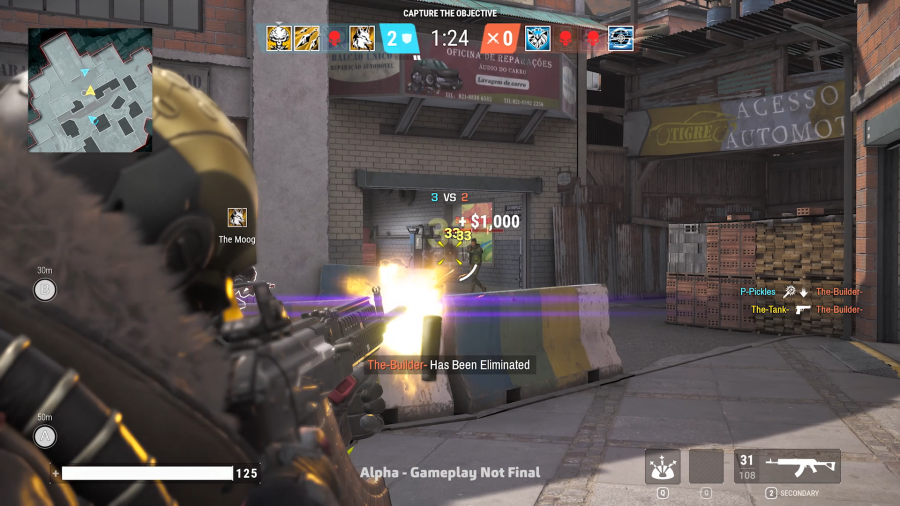
Out of interest, have you guys been following Crucible’s release and if so, what lessons have you learned?
Part of the struggle with Crucible was that they had multiple game modes that weren’t very obvious. Within those game modes, the objective was a little bit veiled.
We’ve tested a variety of modes from just pure deathmatch to plant and the defend the bomb kind of thing, right? And what we netted out was that we should be shipping with the ones that are the pure objective base game modes. We don’t want pure deathmatch modes, but as we think about which ones we ship with, and how they work, we definitely have been very cognisant around the fact we should have a mode where it’s obvious what to do.
We definitely had some stuff in incubation that was just really high concept or maybe less obvious but that’s not the right thing to move in the game into beta with. So I’d say that’s probably the most formative change that was made as a result of industry dynamics I guess.
You mentioned about ranked being on the roadmap, how far along the line is that?
This is a great place for us to leverage our experience with all of our other titles where we’ve done a tremendous amount of work on ranked matchmaking. Those games run off of essentially ELO or TSR type systems. You’re looking at a similar approach for Rogue Company.
It won’t be quite like, bronze, silver, gold, platinum – that’s not the plan right now. It’s a little bit more like an FPS ladder – a bit like the older Halo games. As I said, Scott, the lead designer is an old Halo guy, so it’s kind of what he’s pushing for.
I’d say that the design isn’t done on the rank matchmaking, but we have a lot of experience with ranked matchmaking at this point across our games. And the biggest things are match quality and match frequency, and so you have a couple of knobs that you turn to nail that in. Really our goal is to provide a really fun ranked experience for 99.3% of our players. And then for that lingering portion of a percentage isn’t satisfied. That’s when you start seeing esports, other kinds of extra matchmaking, or even third-party matchmaking stuff, like FACEIT. So we have a pretty good playbook.
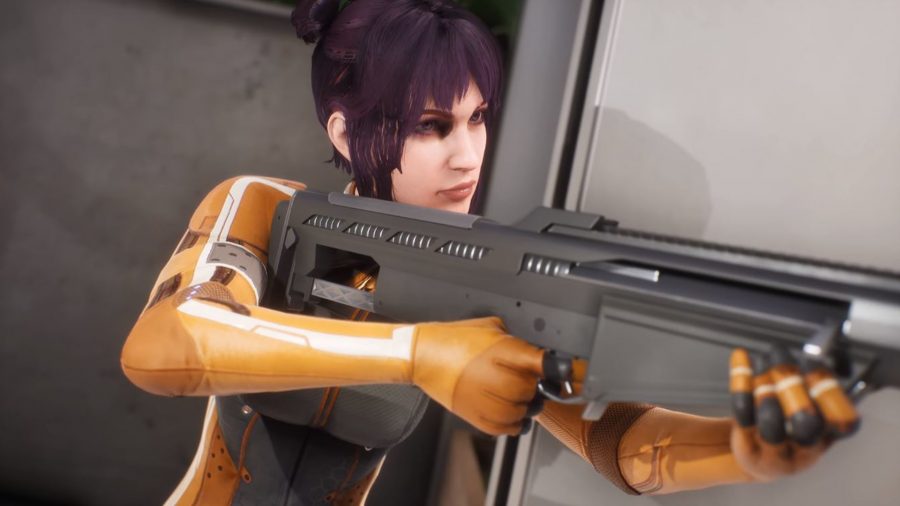
The game is shipping with cross-play. How important is that to the team and do you think a game’s success nowadays rides on its ability to have that feature?
Cross-play is integral to our success. It’s integral to what we’ll do as a studio – all of our games are now cross-play. And this one will be the first that we ship with cross-play.
Cross-play is all well and good. But what really makes it work is cross-progression, which is the harder part right? So with our previous titles, we don’t have cross-progression across all platforms – we do across the ones that participate. But with Rogue Company, it will be cross- platform, cross-progression at launch, which is a pretty big feat for us. That’s the magic right? Yeah, you can play with your buddy on Switch, but now it’s like yeah, you can actually just play your account anywhere you go, which is pretty exciting.
How important is it for a game to ship with something like that? Jeez, I mean, I think unless you’re making a game like a Valorant where it’s only really intended for PC play, it’s a bonafide requirement moving forward for consumers. It’s one of the kind of like tenets of I think how you’ll see us build games for now into the future. And we’re really excited about this one because as far as we can tell, we’re going to be the first company to ever ship a game, that’s cross-plat and cross-progression on four platforms at the very start. So that’s pretty exciting. And so yeah, we’re definitely we’re definitely committed to this path.
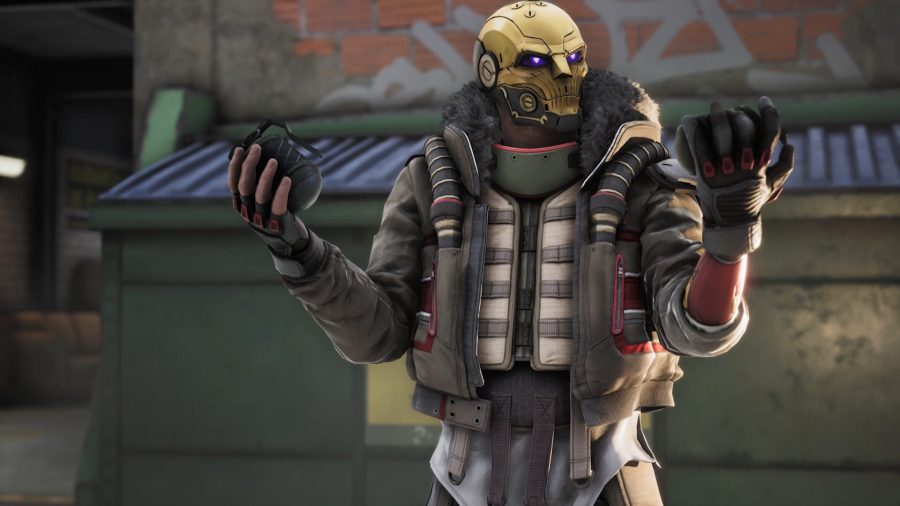
How do you protect competitive integrity when it comes to cross-play? Fortnite has had a particularly difficult time balancing console aim-assist, for example.
There’s a couple of vectors that we think about, but there’s only really one way to do it, which is that you try to make the most equal playing field you possibly can.
So when it comes to console players, there is a hierarchy of inputs – you let people opt up if they want, but you don’t let people opt out. So if you’re on a console, you are allowed to play in the PC queue if you so choose by opting in. But if you’re on a PC, you can’t go and play in the Xbox or PlayStation queue exclusively.
When it comes to how controllers perform in PC or mixed lobbies, the way that we are approaching that is with a database approach. Our goal is to keep the difference between playing on a mouse and keyboard and playing on a controller as tight as possible. And we will obviously have grave concerns if we see that one of those input methods starts becoming dominant.
But I feel pretty good about this, even though I feel terrified about this question given how problematic it’s been in Fortnite. But I’m mollified by the fact that our lead designer is an ex-console pro. So we have people that are highly, highly competent at using the controller and competing today in our play tests with our PC development team. So we’re able to get some initial good data that I’m relatively certain that when it comes out, it’s not just going to be a disaster. Then we’ll continue to tune it as it goes.
Lastly, how’s the alpha test going?
It’s going great. If you’ve ever covered Hi-Rez games in the past, you’ll know we are not scared of iteration – I would say that is our strongest suit and maybe even our Achilles heel! The alpha is rapidly evolving but it’s starting to cool down now as we near closed beta.
One of the things that’s kind of maybe understated about technical alphas is the morale upside for the development team where they start seeing people interacting with the game and being excited – that is a really important part of game development. And that’s one of the things that , historically 20 years ago, was probably what drove the industry to get as aggressive with shipping stuff.
Now you kind of have these gradual roll out periods where you get to engage with the community and it keeps the wheels on the bus a little bit longer in terms of stress and deadlines. You can feel stressed out with deadlines, but when you see people saying they love the game, it makes it totally worth it.
Rogue Company is scheduled for release later this year. It’ll be available on the Epic Games Store on PC, as well as the PlayStation 4, Xbox One, and Nintendo Switch.
